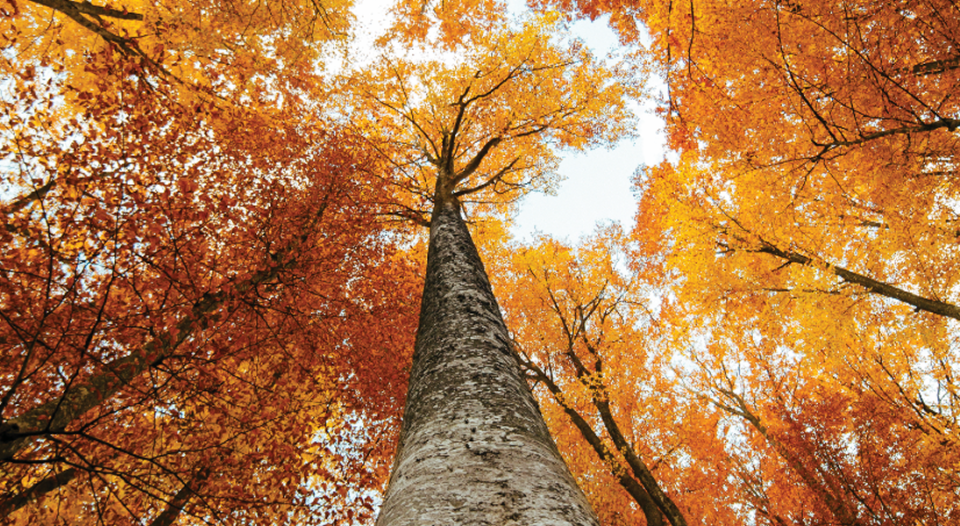Editor’s note: This modified excerpt from Heidi Barr’s Collisions of Earth and Sky: Connecting With Nature for Nourishment, Reflection, and Transformation (Broadleaf Books, 2023) is reprinted with permission.
There is something sacred to be found in how the winter sun casts shadows on snow-covered ground, or in how a walk through an old forest reminds you of what you are truly devoted to. There is something sacred in continuing to put your life energy where it is returned, in kind. Somehow the wild silence ties all things together, as one being, even when that silence also holds a continuing evolution of understanding.
I grew up in the ELCA. My family went to church most Sundays, and I can still hear my paternal grandmother saying grace before we dug into meals on the farm table, her voice rising to emphasize the first three words, “Come, Lord Jesus,” and then dropping in tone to finish with “be our guest, and let these gifts to us be blessed.”
My maternal grandparents met working at a Lutheran Bible camp in Illinois; my parents met working at a Lutheran Bible camp in Colorado; my spouse and I met working at a Lutheran Bible camp in Wisconsin. Lutheran Christianity will always be a central part of my spiritual story for the simple fact that it’s the first lens through which I consciously thought about God.
I wanted to spend more time outside in contemplation. I wanted to spend less time deciphering scriptural texts and more time with the sacred that is nature itself.
I worked at four different wilderness-based ELCA youth camps during college and the years just after, and the fellowship, community and proximity to nature they provided made me feel closer to a higher power. Ironically, it was my time completing a master’s degree at Luther Seminary in St. Paul, Minn., when I found myself becoming more welcoming of other belief systems and less certain of my own, more inclined to ask questions and less inclined to say, “I know the answer.”
I found myself caring less about what happens inside a human-made sanctuary and more about what happens outside the church’s doors, amid the cycles of the earth. I wanted to spend more time outside in contemplation. I wanted to spend less time dissecting scriptural texts and more time with the sacred that is nature itself.
Strategies for centering the wild
Spirituality is an ongoing, personal journey—I can’t claim to know the formula required to “rewild” it. However, I do have a few strategies that have proven essential on my own path.
- Go outside more than you think you should. Get intimate with what resides outside your front door, in the weedy patch between the two abandoned houses down the block, at the neighborhood park. Learn to love what’s out there, and let it love you back. Bring little bits of it inside. Keep going back out.
- While you’re paying attention and being curious, celebrate contrast. Diversity is essential for a thriving life, and the wild is one of the best teachers of this truth. See the beauty in the garden as different types of vegetables and fruits and weeds all intermingle in a tangled mass. See a similar beauty in how different your fellow humans are—those down the block and those on the other side of the world. Marvel at how good a warm fire feels after you’ve been hiking in a snowstorm. Celebrate the fact that bright light makes shadows, and the need for both to live into our creative human potential.
- As you celebrate contrast and diversity, think specifically about your food. Jesus and his disciples broke bread together; it’s a sacred act. Food is important when it comes to spiritual things for myriad belief systems. And when you eat a diet that’s rich in color, texture and varying tastes, you set your body up for optimal health. We need more than monocropped corn and soybeans to thrive. When we grow a wide variety of food ourselves, or get it from others who do so sustainably, we play one small role in fostering better health for the earth.
- Finally, while eating, let the food you ingest remind you that you have a body, that that body works together with a mind and spirit, and that those things are always trying to reclaim their wildness—both as individual entities and as members of a collective. The need for nourishment brings us together, over borders and across generations.
Even a snowy day deep in the winter of the American Midwest has the power to remind me of the vast web that connects all things on the earth and my place in it. It reminds me of my own wildness and how essential it is to continue to claim it.
Devotion to something starts with paying attention to it. It reminds me to pay attention to the bedrock beneath my feet, the sky above my head, and the community (human and otherwise) in which I make my home. We are devoted to that which we give attention to. Let’s give our attention to the wild, outside ourselves and within.





